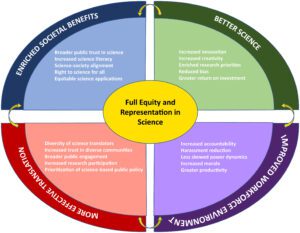In pursuing a fair and inclusive society, the spotlight on women and minorities‘ participation and significance remains crucial. From the workplace to politics, education, and beyond, acknowledging and amplifying the voices and contributions of women and minorities is not just a matter of equality but a fundamental necessity for progress and innovation.
Closing the Gender and Minority Gap:
Despite significant strides in recent decades, women and minorities still encounter barriers to equal participation in various spheres of life. In corporate boardrooms, women remain underrepresented, especially in leadership roles. Minorities often face systemic biases and discrimination, limiting their access to opportunities and resources. Recognizing these disparities is the first step toward addressing them effectively.
Economic Empowerment:
Enhancing women’s and minorities’ participation in the workforce isn’t just about fairness; it’s about economic empowerment. Studies consistently show that diverse teams and inclusive workplaces outperform homogenous ones. When women and minorities have equal access to employment and advancement opportunities, it drives innovation, enhances productivity, and stimulates economic growth.
Political Representation:
Political participation is another crucial area where women and minorities strive for equal footing. Despite some progress, legislative bodies worldwide still lack proportional representation of women and minority groups. When diverse voices are underrepresented in decision-making processes, policies may not adequately address the needs and concerns of marginalized communities.

Education and Opportunity:
Education is often hailed as the great equalizer, yet disparities persist in access and quality, particularly for women and minorities. Providing equitable access to education and fostering inclusive learning environments are essential steps toward levelling the playing field. When individuals from diverse backgrounds have access to quality education and training, they are better equipped to pursue meaningful careers and contribute to society.
Overcoming Bias and Stereotypes:
One of the most significant challenges in advancing women and minorities’ participation is overcoming deep-rooted biases and stereotypes. Implicit biases, whether conscious or unconscious, can shape perceptions and influence decision-making processes, perpetuating inequalities. Organizations and communities can mitigate bias and create more inclusive environments by promoting awareness, education, and diversity training.
Celebrating Diversity and Intersectionality:
Recognizing the intersectionality of identities is crucial in understanding the unique experiences and challenges faced by women and minorities. Intersectionality acknowledges that individuals may experience discrimination and privilege differently based on their race, ethnicity, gender, sexual orientation, ability, and other factors. Embracing diversity means valuing and celebrating the richness of experiences and perspectives each individual brings.
Conclusion:
In the journey toward equality and social justice, prioritizing women and minorities’ participation and significance is not just a moral imperative—it’s a strategic imperative. By fostering inclusive environments, breaking down barriers, and amplifying diverse voices, we can create a more equitable and vibrant society for all. It’s time to embrace diversity as a source of strength and collectively work toward a future where everyone can thrive, regardless of gender, race, or background.
